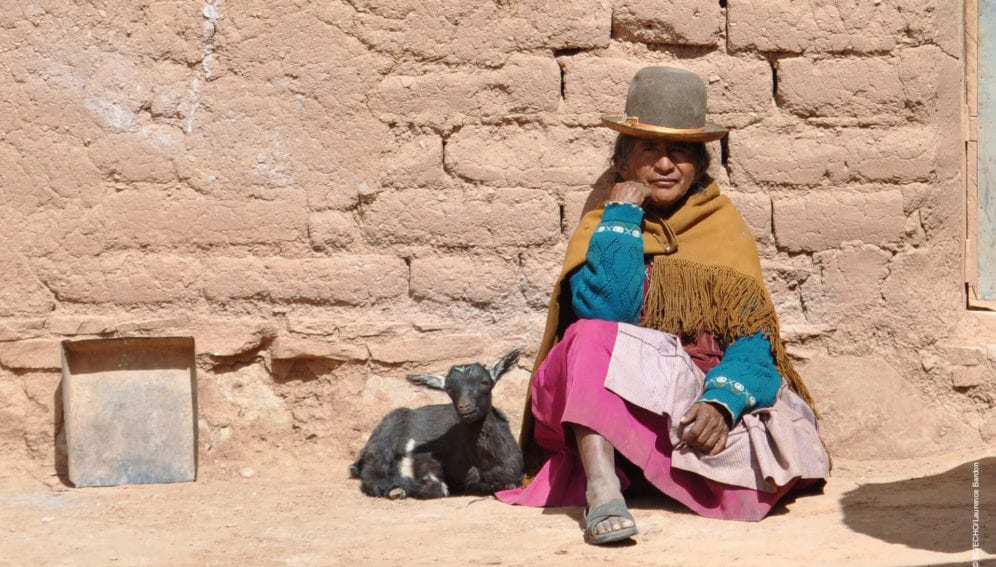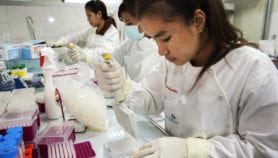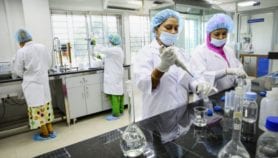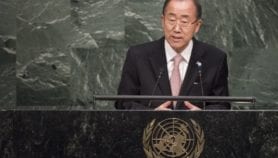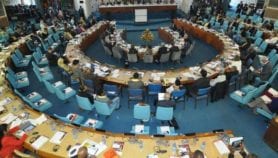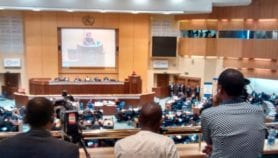By: David Dickson
Send to a friend
The details you provide on this page will not be used to send unsolicited email, and will not be sold to a 3rd party. See privacy policy.
Local people need a say in the science that will back the post-2015 development agenda, argues David Dickson.
The phrase 'science for the people' was originally coined by radical students in the United States protesting at how the control of science was being increasingly dominated by the so-called military-industrial complex.
It was therefore something of a surprise to hear of the need to "bring science to the people" at a meeting in the august surroundings of London's Royal Society earlier this month (6 June), expressed by Amina J. Mohammed, the UN secretary-general's special advisor on post-2015 development planning.
It was also significant. The phrase went to the heart of the theme of the meeting, which was jointly sponsored by SciDev.Net, namely science's role in achieving the development objectives that will succeed the Millennium Development Goals (MDGs) from 2015.
Part of this role is technical and pragmatic. As has been frequently argued on SciDev.Net, science and technology are vital components of any practical effort to achieve the MDGs. They also have a key role to play in helping to measure how far — and how effectively — individual development goals have been met.
But there is a wider political issue as well. As Duncan Green, senior strategic advisor at Oxfam GB, told the Royal Society meeting, development in general — and poverty reduction in particular — can only be achieved with the full support and engagement of those it is intended to benefit.
This applies as much to science as to any other sphere of expertise. Perhaps even more so, since modern science — with its implicit rejection of the intellectual and religious frameworks on which many traditional cultures are based — is still too often seen as an alien expression of foreign interests and, perhaps inevitably, is treated with suspicion as a result.
Science back in fashion
The MDGs were formulated at the end of the 1990s, when science was out of fashion in the development community on the grounds of having no direct link to poverty alleviation. In contrast, the new development goals are likely to explicitly recognise the important contribution that science and technology can make.
The report from Ban Ki-moon's High-level Panel on the Post-2015 Development Agenda, for example, published at the end of last month, calls for, among many other things, a commitment to "promote collaboration on and access to science, technology, innovation, and development data".
But it is clear, as SciDev.Net director Nick Perkins wrote in a recent editorial, that much remains to be done to show how the report's principles can be put into practice. This includes the need to provide "clear and persuasive messages for engaging science", and details of how science's engagement with sustainable development is to be achieved.
One way of doing this is to show how science can contribute to achieving an objective that the current MDGs largely ignore: social empowerment, or the ability of communities to influence and control the decisions that will directly affect their lives.
Those at the Royal Society meeting suggested various ways to achieve this. They include forming alliances between citizen groups and academic research institutions, and creating easier access to scientific results or the use of intellectual property to promote the interests of the world's poor.
Another is to build closer working links between scientific and non-governmental organisations (the subject of last month's SciDev.Net Spotlight). One successful example of this, highlighted at the meeting, was the Global Trachoma Tracking Project, launched last December, under which up to four million people in Ethiopia and Nigeria will be checked for the infectious eye disease, the complete eradication of which has been targeted for 2020. [1]
Far from neutral
What all these suggestions have in common is the recognition that, however neutral science may be as a purely intellectual endeavour, it is far from nonpartisan as far as its applications are concerned. The context and dynamics of application are critically important, and these are often not neutral. Science-based technologies — mobile phones perhaps being the exception — tend to meet the needs of the rich and powerful rather than the poor and powerless.
Local communities should also be directly involved in discussions on how its results should be applied, as the NGO Practical Action has done in encouraging discussion on how nanotechnology can help sustainable development.
Only once this idea has been established as a basic paradigm can tensions between modern science and traditional cultures be adequately managed — even if they may not be eliminated. Without it, distrust will remain high, as shown by local responses to genetic modification techniques or polio vaccination programmes.
Science communication has a vital role to play in this. The seventeenth century philosopher Francis Bacon expressed it in a nutshell: "Knowledge is power". As he predicted, in the modern world, access to scientific knowledge — which science communicators help provide — is truly a source of social empowerment.
Introducing an empowerment dimension means that the post-2015 development agenda will inevitably be a political one; there is too much at stake, and too many conflicting interests, for it to be otherwise. If the research community were to mobilise its efforts around the slogan "science for the people", it would clearly indicate which side it is on.
Link to High-level Panel on the Post-2015 Development Agenda report
David Dickson is a science journalist who has worked on the staffs of Nature, Science and New Scientist, specialising in reporting on science policy. He was the founding director of SciDev.Net 2001–2011.


